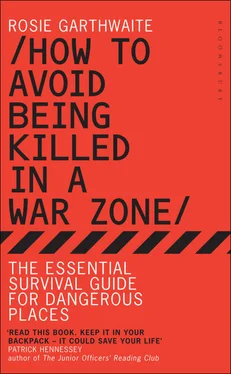As the period of incarceration increases, so does the danger that the kidnappers will get caught. Likewise, as their fear increases, the price on your head will fall. The same is broadly true if your value is political rather than monetary. Media glare eventually falls away, making it less likely that the kidnappers will get the attention they seek.
But negotiation is rarely as simple as an equation involving value versus time. There are many more factors that come into play.
Imad Shihab advises: ‘Be grateful for a negotiation in today’s world. So often in Iraq in the past it has been impossible to negotiate. They were simply not interested in money or in the welfare of their victim. If they are willing to negotiate, you need to come to them open-handed.’
After the Iraq war in 2003 kidnapping became the favourite weapon of many small groups of fighters. Money was earned passing a hostage up the chain from criminal gangs to those with a political agenda. It became common to watch the pixillated videos of hostages in distress in the moments leading up to their horrible murders. The media coverage had become an incentive for kidnappers. Since around 2005 there has been an unwritten agreement within the media not to broadcast the manipulation and revolting treatment of hostages. The media decided that broadcasting kidnap videos was increasing the value of the hostages – and audiences were telling them that they did not like seeing the videos.
Since then the kidnapping has not stopped, and the pictures keep coming into newsrooms, but the agreement not to broadcast has removed the glamour. The publicity has gone away and so have the excesses of 2004–5.
There are very few organizations that offer help for hostages and their families, but www.HostageUK.comcan give you support and point you in the right direction. The government or company your relative or friend is working for should also be making efforts to get them out. But at the end of the day it’s the families and friends who will be the real drivers of the negotiation. Sue Williams says you should never underestimate the power of their work:
‘The families, ordinary people, will become extraordinary, finding an inner strength to keep fighting for freedom. They will be supported by and seek comfort within their social network and local community. Everyone will be watching the media. Friends who have not spoken for years will be in touch. Prayers, vigils, concerts, petitions and many similar activities will be taking place.
‘Board members will be chairing crisis meetings and making difficult decisions against the backdrop of “getting it wrong”. Co-workers will be circulating updates.
‘Governments will be applying diplomatic pressure directly or indirectly and searching for the individual or group that wields influence and will be key to a hostage release.
‘Many people who have never met the hostage will be making his or her release a priority and letting the safety of a stranger take over their own lives.’
/WHAT ARE THE KIDNAPPERS THINKING?
If you know how to approach your captors, you can do as much work on getting released from the inside as people can do on your behalf on the outside. Imad Shihab recommends: ‘Know who your kidnappers are. The fine details of their politics and their history are vital to any negotiation. Know why they targeted you. Is your value political or financial?’
Qais Azimy is one of the best journalists I have ever met. He works in Kabul for Al Jazeera English, but could put his skills to use anywhere in the world. His ability to negotiate himself into and out of anything has saved his life several times. He recalls: ‘I was kidnapped by the Taliban in 2007 and what I learnt is not to give up. At that time, when we were kidnapped for 38 hours, they said every hour that they would kill us in the next hour. But we didn’t give up; we tried and tried to win them over. They were open to understanding. We opened their brains to the idea that every foreigner was not a George Bush.
‘I was with a British journalist at the time and he put my life at threat because of his race, his non-Muslim status. I was praying all the time. My belief at that time grew. Whatever religion you are, you become more religious because you see all other roads blocked. You are waiting for magic to happen. Then it did – the kidnappers changed their opinion. They released us. When we left we wanted to send off the story, but there was another truck waiting to kidnap us again. I learnt to expect the unexpected, not to let my guard down.’
Sue Williams stresses the need to find common ground with your kidnappers: ‘You need to get them to see things from your point of view. They are scared too. They have families too. This can be used to your advantage.
‘Attempting to change your status from hostage or commodity to human being is essential. This is achieved by personalization. Talk about your family and home; use your first name and theirs. It is less likely for them to hurt someone who has become a personality.’
Part of that is standing your ground, as Qais Azimy illustrates: ‘In 2009 I was arrested by the Afghan Army. It felt like I was kidnapped. I had no contact with the outside world. I was blindfolded and they took me to a ditch, and I could hear gun noises, like they were going to kill me. They were pretending, but I didn’t give up. If you give up they will think you are guilty and that they are doing the right thing. Fight for your life.’
In most cases kidnappers will be balancing your value against the danger that they will be caught. When this calculation tips far enough in either direction you are likely to be released. It is worth the wait. You need to sit tight. The advice from everyone I have spoken to in the writing of this chapter is that rushed rescues often lead to disaster.
This softly, softly approach is supported by Qais Azimy, who told me a sad story: ‘Sultan Munadi was a close friend of mine. He was kidnapped with New York Times reporter Stephen Farrell in 2009. He had such experience in the field and had never been kidnapped, but he died in the rescue by special forces. They killed him even though he shouted “Journalist! Journalist!” They should have fought for his release before the operation was carried out. In my opinion, they wanted to downplay the importance of the hostages to the Taliban.’
Mohammed Hersi has played both sides of the kidnap game – as a pirate, and now as part of the fledgling Somalian anti-piracy force. He advises hostages to stand their ground: ‘My advice to anyone passing through the Gulf of Aden is to carry a weapon and defend yourself. Do not make it easy for the pirates. Resist handing over a ransom. It is keeping the pirate business alive.
/HOW TO AVOID BEING KIDNAPPED
There is actually little you can do to prepare, but keeping your wits about you never goes amiss.
Enlist someone localto help you negotiate a safe route to wherever you are going. Someone who can tell you how to dress, how to act and what car to drive. In Iraq at one point there was a single ‘ruler’ of each area, or each street in some cases. If he wasn’t happy for you to pass through, you were in danger of being kidnapped or killed. Sometimes safe passage will take a cup of tea and a handshake; at other times it could involve hundreds of dollars. You might think it unreasonable, but far worse would be for them to think you unreasonable.
Avoid making yourself a target.If you are exceptionally rich or working for a rich company, or if you are carrying a lot of cash, never let it be known unless necessary. If you have kidnap and ransom (K & R) insurance, or you have been told that your company has, do not let anyone around you know.
Читать дальше




![Джонатан Димблби - Barbarossa - How Hitler Lost the War [calibre]](/books/385421/dzhonatan-dimblbi-barbarossa-how-hitler-lost-the-w-thumb.webp)







